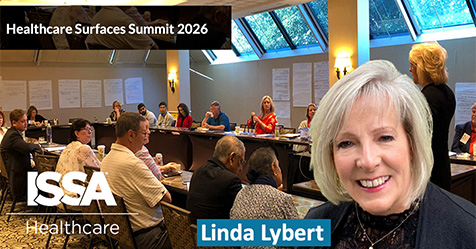Education Takes the Main Stage on First Day of ISSA Show
Sessions span the industry from technology and infection prevention to hiring best practices.
Attendees flocked to education sessions on Monday, the first day of ISSA Show North America 2023 at the Mandalay Bay Convention Center in Las Vegas. With sessions for healthcare, residential, and hospitality cleaning professionals, as well as distributors, manufacturers, and facility managers, there was something for everyone.
Facility managers interested in improving security measures in their buildings learned about a new technology—iris recognition—that can control who has access to their buildings, protecting businesses and facility occupants. The criminal justice industry is using this biometric methodology to identify criminals within the banking industry, healthcare, and school systems.
Bob Cuttita, program manager at the New York State Sheriffs Association, explained how the technology allows for digital photography of people’s irises to identity them before entering buildings. “An iris is like an English muffin with nooks and crannies that are unique to each person,” he said.
Across the convention center hall, environmental services (EVS) technicians pondered whether they should fear the floor as a source of germs. Michael Patterson, IEHA Executive Director, a division of ISSA, said that EVS departments are under increased pressure to turn hospital patient rooms. However, they must be thorough, as 40 to 50% of infections are related to improper cleaning.
Patterson called for the increased recognition and value of EVS workers as a critical part of infection control. “We also need to educate employees to understand the importance of their roles,” he said.
Later that morning, an education session useful for hiring managers taught them how to crack the code when choosing cleaning technicians. Jonathan Porter-Whistman, WhoHire CEO, detailed five traits about human behavior that can help hiring managers get into the minds of their employees:
- Things are only good or bad by comparison. Porter-Whistman recommended thinking about how your team defines “great” and suggested that hiring people whose standard of great is similar to your company’s.
- People are already giving 100% of what they believe they are capable of—or they have a reason they believe is valid for not doing so. Porter-Whistman said workers are not inherently lazy, so a company with a supportive culture can help them work to their fullest potential.
- People love being on autopilot. Porter-Whistman suggested applying creative thinking to processes to shake workers out of that mode into something more active.
- People need to belong. Companies can help them feel like they are included by setting up organizational rhythms, insider language, rituals, and standards, Porter-Whistman said.
- The only reasons that matter are their reasons. “People take a job for their personal reasons; they perform or don’t perform for their reasons,” Porter-Whistman said.
“The thing to remember is people will stay with your business when they can do their best job working with you,” Porter-Whistman said. “If they can’t do their best with you, they will think about finding a new job.”


